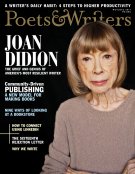 In 2005 publisher Tod Davies set out on the Internet frontier to start a conversation. What she conceived of as an online “art project”—a venture that would bring writers and artists together in a multimedia discussion about how to achieve equity in today’s society—grew wings and became Exterminating Angel Press (www.exterminatingangel.com), an independent book publisher with a big mission: to challenge the received cultural narrative. “In short, we’re taking a practical look at what is and isn’t working on the planet,” Davies wrote in the mission statement of the press, which also produces an online magazine. “EAP believes in solving problems, not just naming them…but if we can’t solve them today, we’ll just keep naming them until we can.” In September EAP published the memoir This Is US: The New All-American Family, David Marin’s account of adopting three children from the California foster-care system; sections of the book appear in issues of the EAP magazine. Next year the press will release Vermont poet David Budbill’s Park Songs, a series of poems that tell the story of citizens on the margins of society who congregate in an urban park. The collection follows the July publication by Copper Canyon Press of Budbill’s Happy Life, which Davies calls “a very EAP book.” The EAP backlist includes fairy tales for adults—E. E. King’s Dirk Quigby’s Guide to the Afterlife and 3 Dead Princes by Danbert Nobacon, a founding member of musical group and anarchist collective Chumbawumba, both released in 2010—as well as books of cultural criticism and history and Jam Today, a cookbook-diary hybrid by Davies, published in 2009. “I know it may sound like a mishmash,” Davies says, “but all the books take issue with a culture that insists domination and hierarchy are the only possible ways to run a world.” While EAP is not accepting full manuscript submissions at this time, the press invites writers to query its magazine, which serves in part as an incubator for pieces that could expand to books. For guidelines on how to submit poetry and prose, visit the Becoming Part of the EAP Community page on the press’s website.
In 2005 publisher Tod Davies set out on the Internet frontier to start a conversation. What she conceived of as an online “art project”—a venture that would bring writers and artists together in a multimedia discussion about how to achieve equity in today’s society—grew wings and became Exterminating Angel Press (www.exterminatingangel.com), an independent book publisher with a big mission: to challenge the received cultural narrative. “In short, we’re taking a practical look at what is and isn’t working on the planet,” Davies wrote in the mission statement of the press, which also produces an online magazine. “EAP believes in solving problems, not just naming them…but if we can’t solve them today, we’ll just keep naming them until we can.” In September EAP published the memoir This Is US: The New All-American Family, David Marin’s account of adopting three children from the California foster-care system; sections of the book appear in issues of the EAP magazine. Next year the press will release Vermont poet David Budbill’s Park Songs, a series of poems that tell the story of citizens on the margins of society who congregate in an urban park. The collection follows the July publication by Copper Canyon Press of Budbill’s Happy Life, which Davies calls “a very EAP book.” The EAP backlist includes fairy tales for adults—E. E. King’s Dirk Quigby’s Guide to the Afterlife and 3 Dead Princes by Danbert Nobacon, a founding member of musical group and anarchist collective Chumbawumba, both released in 2010—as well as books of cultural criticism and history and Jam Today, a cookbook-diary hybrid by Davies, published in 2009. “I know it may sound like a mishmash,” Davies says, “but all the books take issue with a culture that insists domination and hierarchy are the only possible ways to run a world.” While EAP is not accepting full manuscript submissions at this time, the press invites writers to query its magazine, which serves in part as an incubator for pieces that could expand to books. For guidelines on how to submit poetry and prose, visit the Becoming Part of the EAP Community page on the press’s website.









